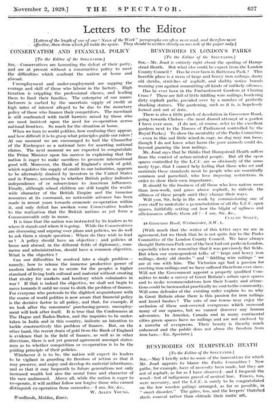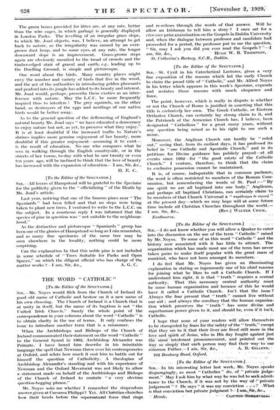BUSYBODIES ON HAMPSTEAD HEATH
[To the Editor of the SPECTATOR.] Sin,—May I briefly refer to some of the innovations for which Mr. Joad appears to blame the Parks Committee ? New paths, for example, have of necessity been made, but they are not of asphalt, as far as I have observed—and I frequent the wood,---but of indigenous gravel of neutral hue. Fences, too, were necessary, and the L.C.C. is surely to be congratulated on the low wooden palings arranged, as far as possible, in "sweet disorder." The gates, too, and the keepers' thatched sheds conceal rather than obtrude their rustic art. The green boxes provided for litter are, at any rate, better than the wire cages, in which garbage_ is generally dispiaYed in London Parks. The levelling of an irregular grass slope, to which Mr. Joad objects, was, I believe, an attempt to get - back to nature, as the irregularity was caused- by an over- grown dust heap, and to some eyes, at any rate, the longer downWard slope is an improvement. Grass:00*n" steps again are obviously- unsuited to the tread of crowds and the timber-edged stair of gravel and earth, e.g., leading up to the Duelling Ground, is simple and picturesque:- One word about the birds. Many country places Might envy the number and variety of birds that live in the wood, and the act of the authorities in introducing golden pheasants and peafowl into its jungle has added to its beauty and interest. Mr. Joad would, perhaps, proseribe these exotics as an inter- ference with nature. May the L.C.C. be more -frequently* inspired thus to interfere ! The grey squirrels, on the other hand, as destroyers of the eggs and nestlings Of our native birds would be better away.
As to the general question of the deflowering of England's natural beauty Mr. Joad says " we have educated adeniocraey to enjoy nature but not, as yet, to preserve *hat they enjoy." It is at least doubtful if the increased traffic to Nature's shrines implies more genuine enjoynient of her beauty, More doubtful if this greater enjoyment—assuming 'it' te exist— is the result of education. No one who compares what he sees in walking through the English countryside, or in the streets of her towns, to-day with what he saw twenty or 'even ten years ago, will be inclined to think that the love of beauty- has increased with the expansion of education.--LI am, Sir, &c.,.
H. E. C. -









































 Previous page
Previous page